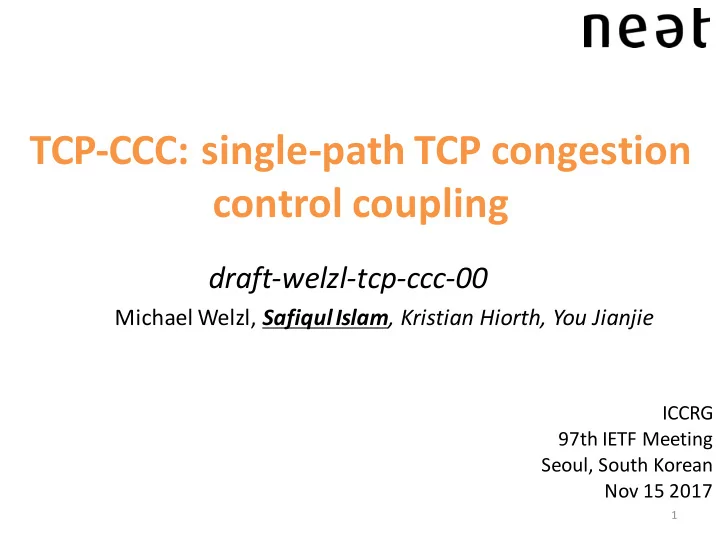

TCP-CCC: single-path TCP congestion control coupling draft-welzl-tcp-ccc-00 Michael Welzl, Safiqul Islam , Kristian Hiorth, You Jianjie ICCRG 97th IETF Meeting Seoul, South Korean Nov 15 2017 1
Motivation • Parallel TCP connections between two hosts: Combining congestions controllers can be beneficial – Very beneficial: short flows can immediately use an existing large cwnd, skip slow start; also avoids competition – Can divide available bandwidth between flows based on application needs • Previous methods were hard to implement + hard to turn on/off (Congestion Manager) • General problem with this: do parallel TCP connections follow the same path all the way? – Not necessarily, because of ECMP, etc. 2
Ensuring a common bottleneck • Via configuration, e.g., app hint – Bottleneck is known, e.g., common wireless uplink • Measurements can infer whether (long) flows traverse the same bottleneck [draft-ietf-rmcat- sbd] • Encapsulation – VPNs, Generic UDP Encapsulation, TCP-in-UDP (TiU) … 3
Motivation (from IETF 95) (ns-2 using TCP-Linux, kernel 3.17.4) 4 Reno flows, 10 Mb bottleneck, RTT 100ms; qlen = BDP = 83 Pkts (DropTail) • TMIX traffic from 60-minute trace of campus traffic at Univ. North Carolina • (available from the TCP evaluation suite); RTT of background TCP flows: 80 ∼ 100 ms Link utilization: 68% Link utilization: 66% • • Loss: 0.78% Loss: 0.13% • • Average qlen: 58 pkts Average qlen: 37 pkts • • 4
Requirements • Simple to implement – minimal changes to TCP code, avoid bursts – Correctly share TCP states 5
Requirements • Simple to implement • Correctly share TCP states 6
Design • Basic idea similar to FSE in draft-ietf-rmcat- coupled-cc – To emulate one flow’s behavior (… but easy to tune) – Keep a table of all current connections c with their priorities P(c); calculate each connection’s share as P(c) / Σ(P) * Σ(cwnd); react when a connection updates its cwnd and use (cwnd(c) – previous cwnd(c)) to update Σ(cwnd) 7
Basic TCP changes The required changes to TCP: • – This function call, to be executed at the beginning of a TCP connection ‘c’ : register(c, P, cwnd, sshtresh); returns: cwnd, ssthresh, state – This function call, to be executed whenever TCP connection ‘c’ newly calculates cwnd: update(c, cwnd, sshthresh, state); returns: cwnd, ssthresh, state – This function call, to be executed whenever a TCP connection ‘c’ ends: leave(c) 8
ACK-clocking to avoid bursts 700 Connection 2 Packet sequence number Connection 3 600 A flow joining with a large share • 500 from the aggregate can create 400 bursts in the network 300 – If not paced 200 Our approach: • 100 – Maintain the ack-clock of TCP 0 5 5.5 6 6.5 7 – Using the ACKs of conn 1 to clock Time (s) packet transmissions of connection 2 over the course of the first RTT when connection 2 joins 700 Connection 2 Packet sequence number Connection 3 – Similarly, we make use of the ACKs 600 of connections 1 and 2 to clock 500 packet transmissions of conn 3 400 – Requires slightly more changes to 300 the TCP code 200 100 [1] Safiqul Islam, Michael Welzl: Start Me Up: Determining and Sharing 0 5 5.5 6 6.5 7 9 TCP's Initial Congestion Window , ACM, IRTF, ISOC Applied Networking Time (s) Research Workshop 2016 (ANRW 2016), Berlin, Germany, 16 July 2016.
Requirements • Simple to implement • Correctly share TCP states 10
TCP states • Once in CA, Slow-Start(SS) shouldn’t happen as long as ACKs arrive on any flow è only SS when all flows are in SS • Avoid multiple congestion reactions to one loss event: draft-ietf-rmcat-coupled-cc uses a timer – TCP already has Fast Recovery (FR), use that instead 11
More results (FreeBSD implementation) • Evaluations were repeated 10 times with randomly picked flow start times over the first second • We generated internet traffic bursts using D- ITG to occupy 50% of the bottleneck capacity on average 12
More results (FreeBSD implementation) Loss ratio Avg. RTT Prioritization Avg. goodput 13
More results (simulation – FCT of a short flow competing with a long flow) 90 1. Short flow 80 2. Short flow - coupled (no-ack-clock) 3. Short flow - coupled (ack-clocked) 70 FCT of short flows (RTTs) 60 50 40 30 20 10 0 0 2 4 6 8 10 Capacity (Mbps) 14
More results – Flow Completion Time (FCT) (FreeBSD implementation) 10 Capacity (Mb) 8 6 Long Flow (uncoupled) Long Flow (coupled) Short Flow (uncoupled) Short Flow (coupled) 0 5 10 15 20 25 30 35 FCT (s) 15
Questions? 16
Recommend
More recommend